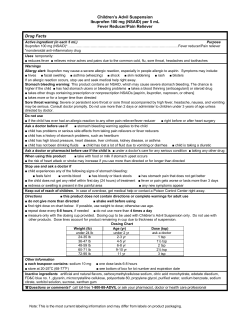
Upper Gastrointestinal Bleeding as a Manifestation of Metastasis
ACG CASE REPORTS JOURNAL CASE REPORT | STOMACH Upper Gastrointestinal Bleeding as a Manifestation of Metastasis from Laryngeal Cancer Amandeep Singh, MD, Hammad Nazeer, MD, Kshitij Thakur, MD, and Monica Zeitz, MD Department of Internal Medicine, Crozer Chester Medical Center, Upland, PA Abstract Upper gastrointestinal (GI) bleeding can be a rare manifestation of primary or metastatic tumor in the stomach. Tumors that commonly metastasize to stomach include breast, lung, and malignant melanoma. Laryngeal cancer usually metastasizes to the lung and cervical spine. We report the first case of upper GI bleed as a manifestation of laryngeal cancer in the stomach. Introduction Neoplasms of the upper gastrointestinal (GI) tract are an uncommon cause of upper GI bleed and account for less than 5% of all cases of severe upper GI bleeding.1 There are many case reports of metastatic tumors in the stomach causing upper GI bleed as their initial presentation.2,3 The tumors that metastasize in the stomach are most commonly lung, breast, and malignant melanoma.4,5 Case Report A 75-year-old white man presented to the emergency room (ER) with complaints of nausea, vomiting, and lower back pain for 1 day. His past medical history included peptic ulcer disease, prostate cancer status post radical prostatectomy in 2007, recent abdominal aortic aneurysmal (AAA) repair, and stage IVa-Tx N2 M0 squamous cell laryngeal cancer diagnosed in July 2009 and treated with 3 failed rounds of combined chemoradiation. While in the ER, the patient developed bloody emesis and became lethargic. He was hypotensive, but otherwise normal on exam. Abdominal/pelvic computed tomography (CT) showed no leak or rupture of AAA, but showed an irregularly shaped 6.2 x 2.9-cm stomach mass along the left posterior wall of the gastric body, lesions in the splenic capsule, and a soft tissue mass posterior to the bladder and inferior to the rectum. Nasogastric tube aspirate was coffee ground in color. Laboratory tests showed hemoglobin 4.8 g/dL and white blood cell count 12.5 k/µL. Esophagogastroduodenoscopy confirmed a large friable mass in the gastric fundus (Figure 1). Biopsies revealed fragments of oxyntic-type gastric mucosa showing metastatic squamous carcinoma consistent with laryngeal cancer (Figure 2). The patient was resuscitated with 8 units of blood products and had no further bleeding, and was discharged with instructions to follow up for palliative radiotherapy. Discussion Typically, primary gastric cancers are adenocarcinoma, squamous cell carcinoma, lymphoma, or gastrointestinal stromal tumors. Adenocarcinoma is the most common type, constituting approximately 95% of all gastric cancers, followed by lymphomas (approximately 5%).6,7 Primary squamous carcinoma of the stomach accounts for less than 0.7% of all primary gastric tumors, with a worldwide incidence of 0.04–0.07%.8,9 Rarely, tumors in the stomach may be from distant metastases, most commonly from tumors of lung, breast, and malignant melanoma.4,5 Typically, metastasis to the stomach presents as a solitary lesion, but can also present with multiple ACG Case Rep J 2015;2(3):155-157. doi:10.14309/crj.2015.39. Published online: April 10, 2015. Correspondence: Amandeep Singh, Cleveland Clinic, Main Campus, Mail Code M2-Annex, 9500 Euclid Avenue, Cleveland, OH 44195 (bansraoaman@yahoo.com). Copyright: © 2015 Singh et al. This work is licensed under a Creative Commons Attribution-NonCommercial-NoDerivatives 4.0 International License. To view a copy of this license, visit http://creativecommons.org/licenses/by-nc-nd/4.0. 155 acgcasereports.gi.org ACG Case Reports Journal | Volume 2 | Issue 3 | April 2015 Upper GI Bleeding From Laryngeal Cancer Singh et al A B Figure 1. Upper endoscopy showing large gastric mass from laryngeal metastasis causing gastrointestinal bleeding. gastric lesions. These metastatic tumors can present with abdominal pain, nausea, vomiting, and bleeding.5 Upper GI bleeding from stomach metastasis can present either as hematemesis or occult blood loss.1,2 There are several case reports of hematemesis caused by stomach metastasis from renal cell cancer, lung cancer, and osteosarcoma.2,10 Laryngeal cancer usually presents as hoarseness, difficulty swallowing, or a lump in the neck. The most common site of metastasis in laryngeal squamous cell cancer is the lung, and cervical metastasis is most common in non-squamous cell laryngeal carcinoma.11 There is only 1 case report in the literature in which metastasis from squamous cell laryngeal cancer was found in the stomach and presented as gastric perforation.12 This is the first report of metastatic squamous cell laryngeal cancer to the stomach presenting as an upper GI bleed. This case is not only an unusual presentation of laryngeal cancer, but also highlights an exceedingly uncommon site for laryngeal metastasis and a rare cause of upper GI bleeding. Disclosures Author contributions: A. Singh collected the data, searched the literature, wrote the manuscript, and is the article guarantor. H. Nazeer and K. Thakur searched the literature. M. Zeitz assisted with the manuscript and approved the final version. References 1. 2. 3. 4. 5. Financial disclosure: None to report. 6. Informed consent was obtained for this case report. 7. Received: December 7, 2014; Accepted: March 4, 2015 156 Figure 2. (A) Gastric biopsy showing ulcerated mucosa along with nest of squamous cells in the center. (B) Piriform sinus biopsy showing normal benign mucosa along with transitional to abnormal layer consistent with atypical squamous cell cancer. acgcasereports.gi.org Savides TJ, Jensen DM, Cohen J, et al. Severe upper gastrointestinal tumor bleeding: Endoscopic findings, treatment, and outcome. Endoscopy. 1996;28(2):244–8. Kibria R, Sharma K, Ali SA, Rao P. Upper gastrointestinal bleeding revealing the stomach metastases of renal cell carcinoma. J Gastrointest Cancer. 2009;40(1–2):51–4. Edwards R, Royle G. Metastatic carcinoma causing haematemesis. Br Med J. 1975;2(5971):598–9. Menuck LS, Amberg JR. Metastatic disease involving the stomach. Am J Dig Dis. 1975;20(10):903–13. De Palma GD, Masone S, Rega M, et al. Metastatic tumors to the stomach: Clinical and endoscopic features. World J Gastroenterol. 2006;12(45):7326–8. Dicken BJ, Bigam DL, Cass C, et al. Gastric adenocarcinoma: Review and considerations for future directions. Ann Surg. 2005;241(1):27–39. Acosta RD, Wong RK. Differential diagnosis of upper gastrointestinal bleeding proximal to the ligament of Trietz. Gastrointest Endosc Clin N Am. 2011;21(4):555–66. ACG Case Reports Journal | Volume 2 | Issue 3 | April 2015 Singh et al Upper GI Bleeding From Laryngeal Cancer 8. Wakabayashi H, Matsutani T, Fujita I, et al. A rare case of primary squamous cell carcinoma of the stomach and a review of the 56 cases reported in Japan. J Gastric Cancer. 2014;14(1):58–62. 9. Boswell JT, Helwig EB. Squamous cell carcinoma and adenoacanthoma of the stomach. A clinicopathological study. Cancer. 1965:181–92. 10. Urakawa H, Tsukushi S, Tsurudome I, et al. Metastasis of osteosarcoma to stomach made clinically evident by hematemesis: A case report. World J Surg Oncol. 2013;11:48. 11. Liu WW, Zeng ZY, Guo ZM, et al. Distant metastases and their significant indicators in laryngeal cancer [Article in Chinese]. Zhonghua Er Bi Yan Hou Ke Za Zhi. 2003;38(3):221–4. 12. Whalen GF, Huizinga WK, Marszalek A. Perforation of gastric squamous carcinoma metachronous to laryngeal carcinoma: Metastatic in origin? Gut. 1988;29(4):534–6. Publish your work in ACG Case Reports Journal ACG Case Reports Journal is a peer-reviewed, open-access publication that provides GI fellows, private practice clinicians, and other members of the health care team an opportunity to share interesting case reports with their peers and with leaders in the field. Visit http://acgcasereports.gi.org for submission guidelines. Submit your manuscript online at http://mc.manuscriptcentral.com/acgcr. 157 acgcasereports.gi.org ACG Case Reports Journal | Volume 2 | Issue 3 | April 2015
© Copyright 2025









![[ PDF ] - journal of evidence based medicine and](http://cdn1.abcdocz.com/store/data/000798193_1-b52fb6b4f723228c9beea3024ff33ad4-250x500.png)


